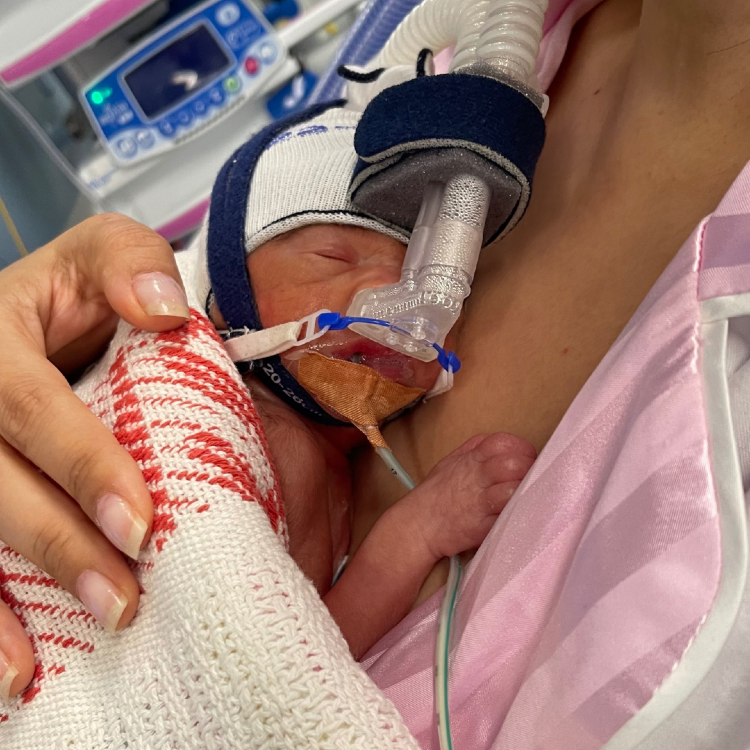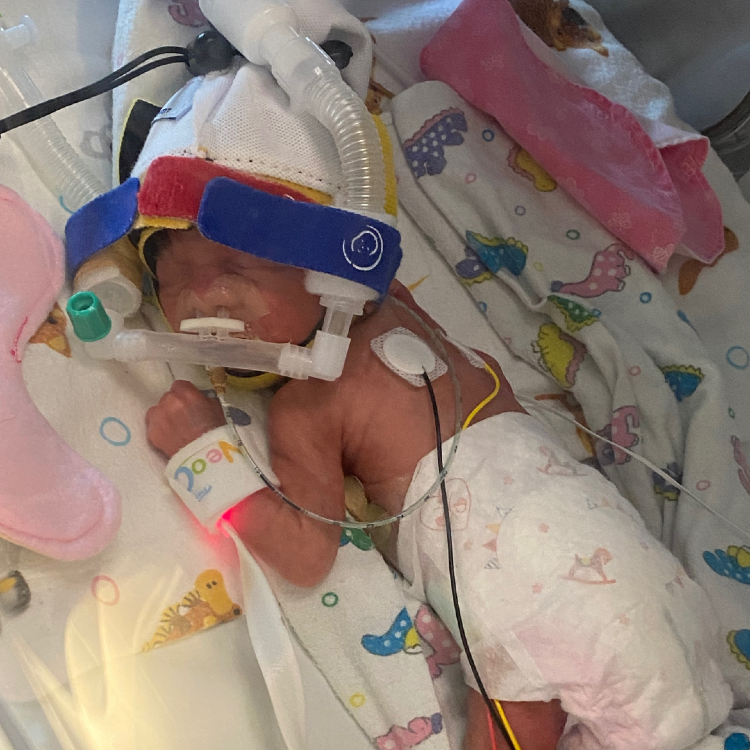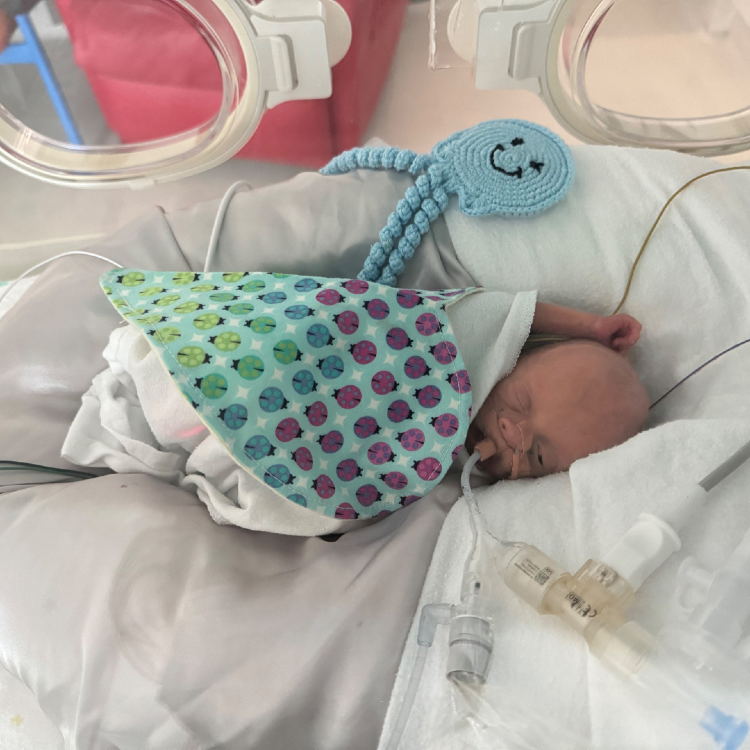Athena, 28 Weeks
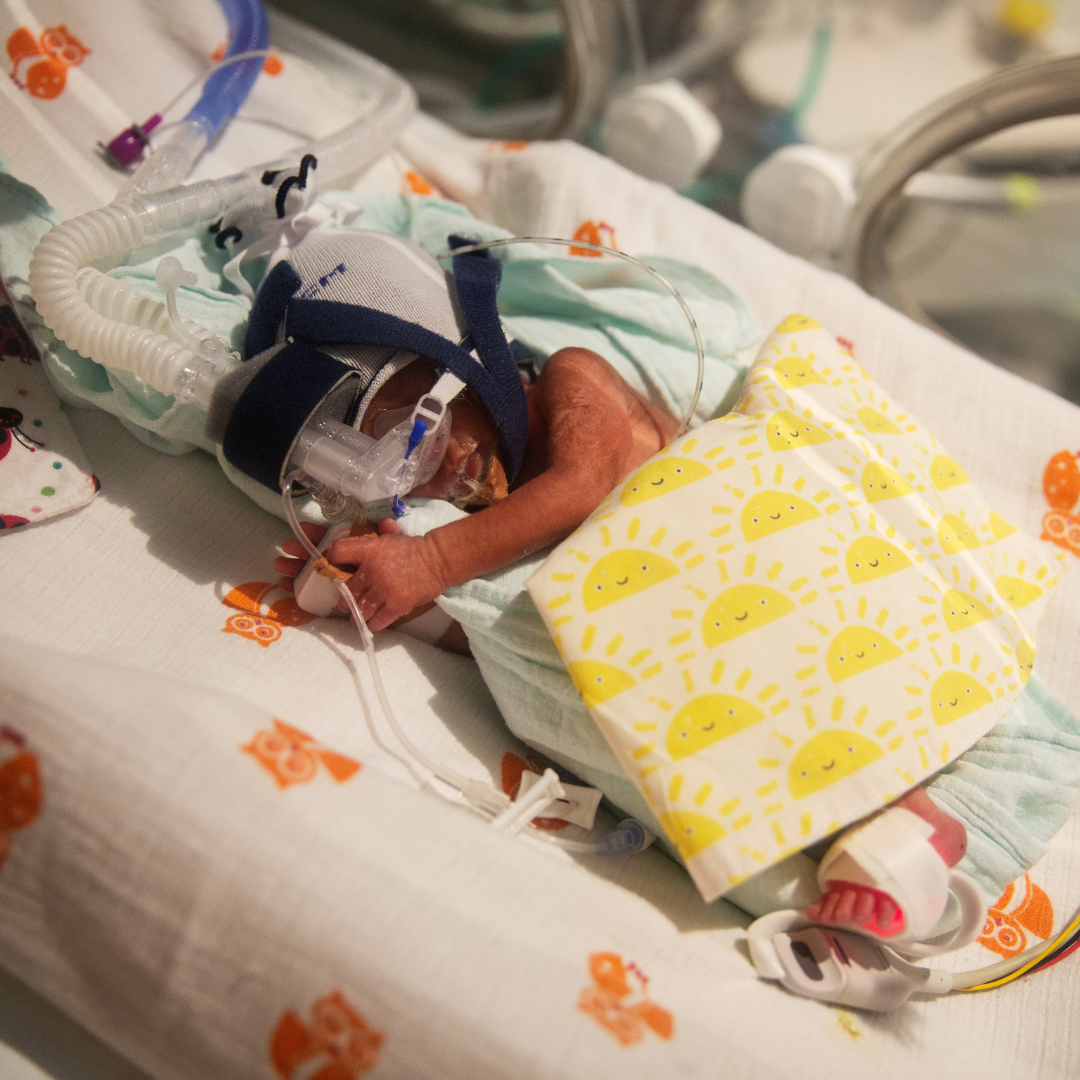
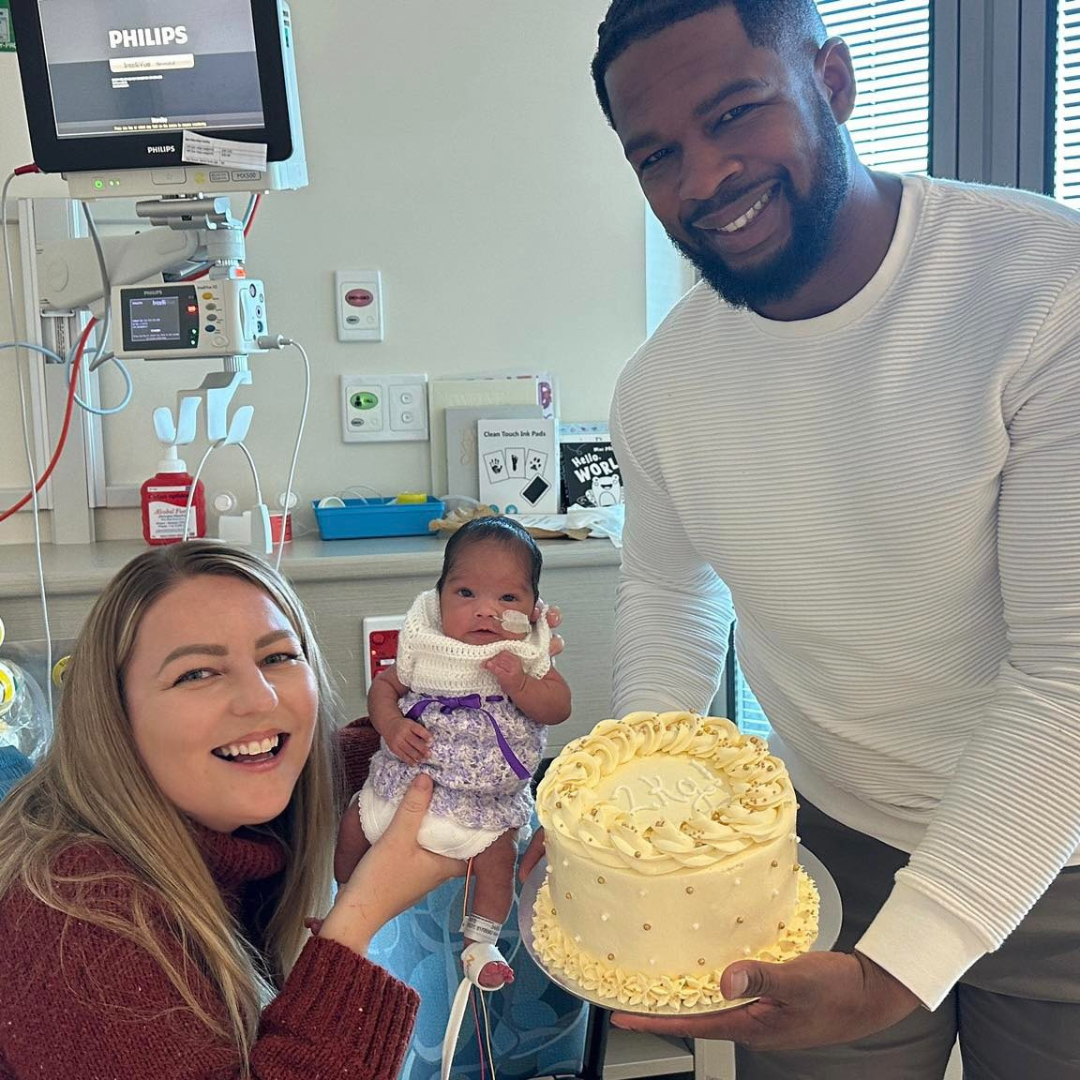
Miracle mum Kiera shares Athena’s birth story:
A journey of survival, strength, and small victories
Nothing prepares you for the moment you realise your pregnancy has become a matter of life and death - not just for your baby, but possibly for you, too.
At our 20-week anatomy scan, we learned that our daughter was measuring two weeks behind where she should have been, and in the 5th percentile. We were told this was most likely due to placental issues, and we were immediately placed under close surveillance. From that point on, our world became one of ultrasounds, doppler scans, and quiet prayers in hospital corridors. The goal was always the same: hold on. Just one more week. Just one more day.
We were measuring her tiny body and blood flow every two weeks - later weekly, and then multiple times a week - looking for any signs of absent or reversed end-diastolic flow, knowing that either would mean emergency delivery. We were constantly on edge.
At 25 or so weeks, our pregnancy took a sharp and frightening turn. I was diagnosed with severe early onset preeclampsia - a rare and aggressive form of the condition that typically doesn’t appear until later in pregnancies. Mine arrived early, and it came with speed and severity.
We didn’t make it to the third trimester.
My blood pressure soared. I developed proteinuria, indicating kidney damage, and rising liver enzymes. My platelet count started to drop, starting to impair my blood’s ability to clot. I felt lightheaded at times and very breathless. My vision would become unfocused, and I couldn’t walk short distances without becoming winded. I was tested for clots in my lungs and fluid build-up, as my ability to breathe became more and more compromised. I found myself using my husband’s asthma puffer in desperation as I struggled to get air in and needing to sleep upright in bed.
Despite the highest and most regular dosage of labetalol they could give - my blood pressure remained dangerously high. I was told that nothing could stop the preeclampsia outside of delivery of my baby, and the medications were merely preventing a stroke, delaying the inevitable.
At this point, I was admitted to hospital indefinitely.
The Countdown Begins
By 27 weeks and 6 days, our doctor told us to prepare for an early birth after a declining ultrasound result. Our daughter had absent flow showing in her umbilical cord, as well as brain sparing, and reduced growth. Their best guess was between 30–32 weeks - a timeframe that already felt far too early. I received two steroid injections to help mature my babies lungs, and third trimester vaccinations to protect her for her early arrival.
But that afternoon, everything began to change again.
I developed pain in my upper abdomen, and my blood pressure and protein levels worsened. Tests confirmed that my platelets had dropped again, and my liver markers were rising - early signs of potential HELLP syndrome, a life-threatening complication of preeclampsia that can lead to liver rupture, stroke, seizures, and organ failure if untreated. We were told the new delivery window by another obstetrician was likely 29–30 weeks. By the next morning, the next obstetrician said it would be a day-by-day assessment.
The Spiral Before Birth
On Friday 23 May, after about 10 days in hospital, my condition had briefly stabilised, a likely side effect of the steroids. The maternity team agreed to let me go home for one night, with strict instructions: I had to return first thing the next morning for blood pressure readings, blood tests, and a foetal stress test. The thought of sleeping in my own bed and being home with my husband - even for just one night - felt like a lifeline.
But it didn’t last.
At 1am, I woke with a pulsing head, chest pain, and a blood pressure of 170/100. I had this overall feeling of not being ‘right’.
We rang the hospital. They told us to come straight to Emergency.
By the time we arrived, my blood pressure had climbed to 185/110. The pain in my chest and upper back had worsened, and I was tested for heart attack, then clots and fluid on the lungs. The emergency staff informed us that my obstetrician had already contacted them: I was not to be given food or more than a sip of water in case emergency delivery was needed. My hand and face were swollen. I was eventually stabilised and readmitted to the Maternity Unit. They told me I wouldn’t be going home again. I’d be staying there until our baby came.
That night, while trying to stay calm, my husband and I were watching a movie in our hospital room. The midwives were checking my blood pressure every couple of hours. I suffered another blood pressure spike to 170/110 despite the high and regular dosage of labetalol. I sensed the beginning of concern from the midwifery team. They then tested my platelets again. Then, the obstetric team ran another foetal stress test. That’s when they discovered our babies heart rate tracings had changed dramatically. She was in severe distress. There was no time left.
Within minutes, the room filled with people representing different teams - anaesthetists, midwives, obstetricians, NICU representatives. My husband was handed scrubs. We were told our baby would be delivered within the hour. I cried as we had just a few seconds to ourselves before I was wheeled away. I told my husband that I wasn’t ready to meet her yet. He responded "she’s not ready to be here yet".
The Birth: Emergency and Aftermath
The emergency caesarean was swift and surreal. I was prepped at lightning speed. Cannulas were placed in both arms, and an epidural was administered all at once as I hunched over, dripping in sweat and panic. My abdomen was quickly opened. The theatre was filled with urgency.
At 28 weeks and 3 days, our daughter was born weighing just 890 grams - not even two pounds. She was held up over the curtain for a split second. I held my breath. She looked impossibly small, and very red. She let out a shrill cry. She was immediately taken by the NICU team who worked over her small body and then rushed to the NICU. My husband followed.
There was no skin-to-skin.
No golden hour.
No first embrace.
I wouldn’t meet her until almost 12 hours later.
What We Didn’t Know Then
Recently, the results from pathology came back. What our baby had survived in utero was devastating.
The placenta had abrupted, pulling away from the uterine wall over time. A massive 6cm blood clot had formed behind it. There were additional smaller clots called placental infarctions, and sections of tissue were necrotic, meaning they were dead from lack of oxygen. The vessels that should have supplied her with life were described as having "high-grade vascular malperfusion" - the arteries had essentially stopped delivering blood.
Our specialist confirmed that had we not been in hospital that night, our baby would have gone into cardiac arrest and passed within a couple of hours. It still haunts me. But she made it. She fought. She lived.
Life in NICU: A New Kind of Parenting
Our babies first breath outside the womb was taken with the help of machines. She was placed on a ventilator, then stepped down to CPAP as her lungs strengthened. Her first feeds were just 1ml every three hours via a syringe into her umbilical line. We watched her progress slowly to a feeding tube through her mouth, to 5ml, then 10ml and so on. Each tiny increment felt like a major milestone.
We weren’t allowed to touch her at first. Her skin was so fragile that stroking could damage it. But after a few days, we were given our first kangaroo cuddles - holding her skin-to-skin on our chest, wrapped carefully in warm layers, as we sat still for hours, drinking in every second of closeness.
Her care was meticulous. She began in a humidity-controlled incubator, with the environment altered sometimes half a degree at a time to prepare her for life outside the isolette. Her tiny nappies were still too big. Her CPAP mask left marks on her nose. She had no fat on her body, and her brain, we were told, didn’t yet have folds. She was given caffeine stronger than a coffee shot to stimulate her breathing reflex.
We learned a new vocabulary:
“Bradys”
“Desats”
“High flow”
“ROP”
And every night, we returned home. I sat in the front living room with the hospital-grade breast pump, pumping every three hours to get my milk supply up, months before it was meant to drop. I had to get my supply up – it felt like the only thing I could do to help her in a time where I felt like I had failed as a mother.
Today and Everyday
Our daughter was given the name Athena, the goddess of warfare, a symbol of strength and wisdom. We knew she needed these traits for her unique journey, and she proved herself to be the strongest little warrior, living up to her name.
After 8 weeks in the NICU and 4 weeks ahead of schedule, Athena was finally in our arms, where she belongs. No words can capture the joy, relief, and gratitude in our hearts. After the hardest, longest months of our lives, our baby girl is home and in the arms of her loving family, her tribe, her safe place.
Today she is nearly 10 weeks old, 39 weeks gestation, and a deliciously squishy 2.5kg. Her sweet little neck rolls are absolutely everything.
Athena has shown us what true strength looks like. She’s overcome every hurdle with quiet determination, living up to our family motto: Kennedys don’t quit. She has changed us forever - especially her mum, who now understands the deepest meanings of resilience, hope, and unconditional love.
We have said goodbye to the monitors, alarms, wires, and the ache of being apart. Though Athena has a few more weeks of feeding support from home, our hearts are full knowing the hardest days are behind us. The road ahead is bright. And it begins here, at home, with our pretty, sweet girl.
Our Gratitude
To the NICU team - her "NICU aunties" - who held her when we couldn’t, who monitored every beat and breath, who celebrated every little milestone alongside us: thank you. You saved her life, and you changed ours.
To John, my husband and anchor - who balanced hospital visits, work, and home life while carrying an enormous emotional weight of his own. Who held me when I cried, cheered me on over every ml of expressed milk, and whispered hope when I was scared and upset beyond words.
To my parents and sister, who flew in from the east coast during those early weeks and held us up when we were running on empty. My sister, who was there for us physically and emotionally, despite having lost her own son at 22 weeks gestation. My dad, who dropped everything at work with the leave that he could. My mum, who rose at all hours of the night as I squeezed my breasts raw trying to bring in milk months before it was meant to arrive. Who binge-watched Outlander with me at 2am, cheered on my first 1ml of milk, then celebrated the move to 5ml, then 10ml syringes. She spent five weeks beside me - rotating between our front living room pumping station and the long days in the NICU, as I expressed 8 times a day, every 3 hours, for the smallest amounts. And to our extended family, both interstate and overseas, who sent prayers and messages of love for our little miracle girl - thank you. Your support carried us through.
Final Thoughts
We missed the third trimester.
But in its place, we were given the most intense, humbling, and miraculous journey of our lives.
Athena is here because of science, because of medicine, because of love - and because of her own shear will and fight to live. We are so proud of our daughter, whose first adjectives from the nurses were “spirited” and “feisty.”
She is our miracle.
And we are so, so proud to be her parents.
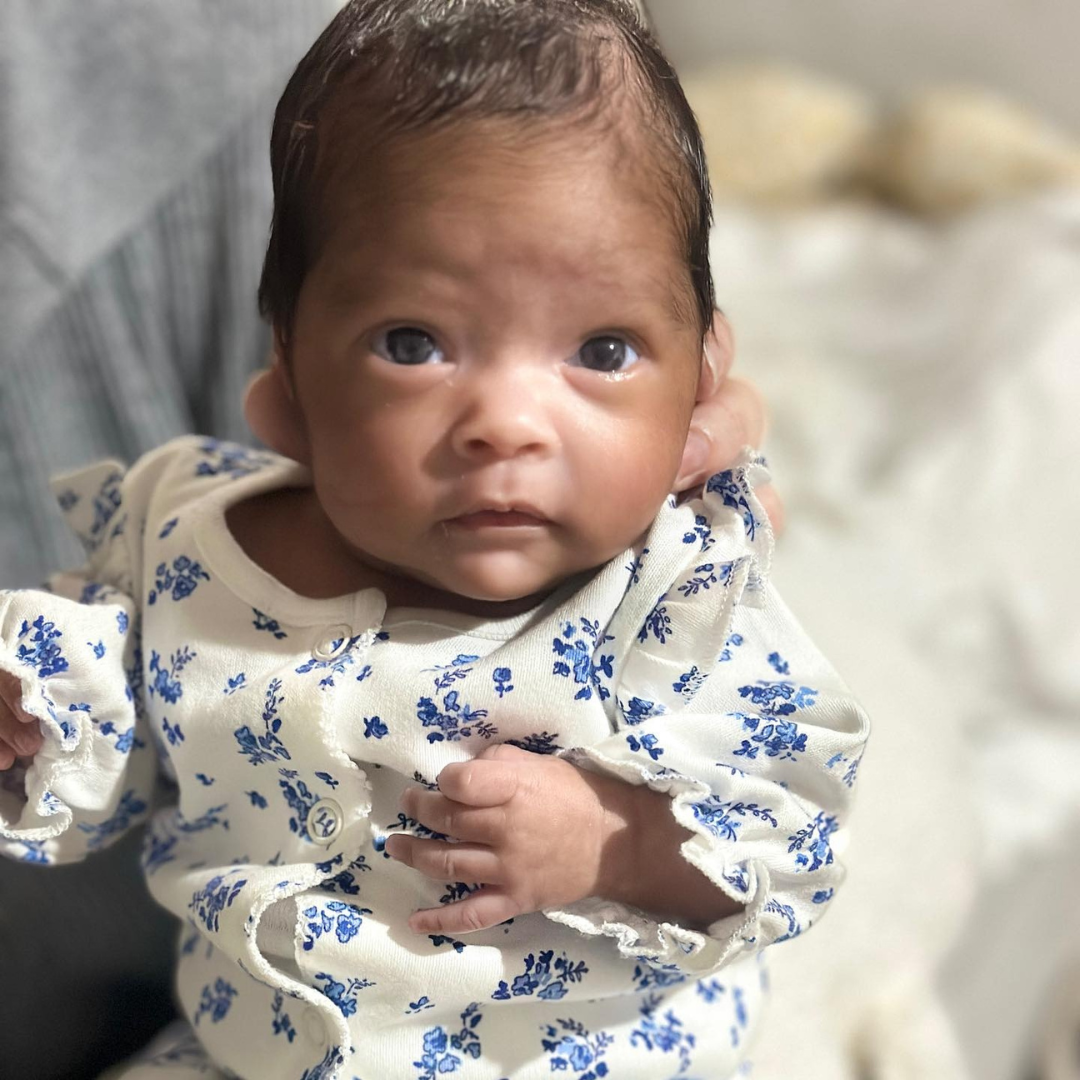
Want to share your story too? We welcome every Miracle family story, no matter what stage of the journey you're at.
We encourage those wishing to share their story to submit it below:
